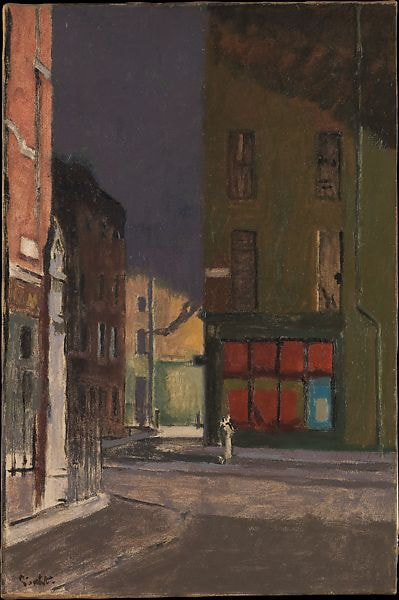|
Maple Street, London (1915) To like desolation more than crowds, and taking-leave more than visits; to like debris more than an old man’s body; to like darkened windows more than light ones, a doorway more than the face and chest, the hands; to like a coat around your slim ankles, and a curb that no one crosses, nobody—a curb for ghosts; yes, to like pavement, to enjoy the feel of grayness and hardness; to feel permanent just before midnight; to prefer standing in the street to standing in a field, and being streetlit to being moonlit, and a small step to lying down; to come into silence as one comes into a family inheritance; to forget the piano lessons and the Austrian; to forget the night of the fair; to forget pudding and holidays and car rides and the beach; to sit in your favorite chair, recalling the week by the book: Bleak House week, then Barchester Towers week, seven days with The Picture of Dorian Gray, and Middlemarch on the horizon; and then to repeatedly boil tea, to repeatedly make toast, to repeatedly prepare for work in the dark, to repeatedly wash dishes in a special way, to repeatedly talk to yourself as Orthodox Christians do when praying; or to string up Christmas cards, and pass your fingertips over raised letters; yes, to think always about Terrance, the rented punt, those leaves spinning in the October water; to have giggled and to recollect that, to have undressed at a certain time and written about it; to like the feeling of bells in sequence; to like Sunday morning more than Saturday night, and fog more than heather, and slow rain more than a deluge, a flood, the gutters overflowing and the banks collapsing; to know that reds, rose and blood and lipstick and ruby, may be held at arm’s length, painted, conjured with, but brown and gray are your daily bread; to know what is governable and what is not, what a doorknob is and what a mood, what meals are and the time of death, hemlines and the true limits of intercourse; and then, to like walking at odd hours, to like inclement weather more than fair, and flint gray more than green; to understand the meaning of on the track, on the track again, on the track, and bare ruined choirs, and shroud of talk; to cradle your purse like you would cradle a child, and also like a child might cradle an old toy, or the grief-stricken their arms; yes, to be swollen and then to be swallowed with no one watching. Brian Johnson Brian Johnson is the author of Self-Portrait, a chapbook; Torch Lake and Other Poems, a finalist for the Norma Farber First Book Award, and Site Visits, a collaborative work with the German painter Burghard Müller-Dannhausen. He has taught creative writing at Brown, Yale, and Southern Connecticut State, where he is currently professor of English.
0 Comments
Your comment will be posted after it is approved.
Leave a Reply. |
The Ekphrastic Review
COOKIES/PRIVACY
This site uses cookies to deliver your best navigation experience this time and next. Continuing here means you consent to cookies. Thank you. Join us on Facebook:
July 2024
|




